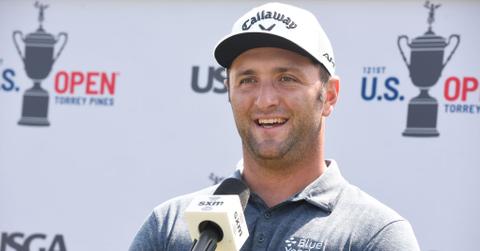Why Are Vaccinated Athletes Testing Positive for COVID-19? It's Complicated
Published June 26 2021, 2:48 p.m. ET

As the U.S. opens back up this summer, that means stadiums are filling up faster than you can say "baseball." Sports fans have been missing their favorite games for over a year, and it's understandable why they're excited to see American sports teams back in action. But while safety mandates are still in place, and vaccinations are likely encouraged in the sports industry, that doesn't mean there aren't risks for athletes.
You may have read about athletes testing positive for COVID-19 even after getting vaccinated, which could be worrisome. But let's talk about what this actually means and why it's not really that surprising sports players can still get sick with COVID-19 even if they're vaccinated.
Why are vaccinated athletes testing positive for COVID-19?
Vaccinated athletes are testing positive for COVID for the same reason we can all still test positive for COVID after getting vaccinated: The vaccine doesn't fully protect us from the virus (although it's very unlikely vaccinated folks will end up with a severe case with COVID). Also, many athletes develop COVID with no symptoms (a "breakthrough" infection), and reports say that athletes are "among the last being tested intensely for the virus."
This is a problem when athletes are in close proximity to each other all the time. — and it could pose a huge issue for something like the Olympics, which is a worldwide event. It could potentially mean another way for the virus to re-spread.
"These surprising positive tests are a problem for the hosts of large events. In the case of the Olympics, they could trigger an outbreak in the surrounding Japanese population or beyond, to any of the 200 participating nations—in addition to creating chaos in competitions," the Wall Street Journal writes.
On a more positive note, these "breakthrough" infections that athletes are experiencing are seemingly rare. "Breakthrough infections are believed to be rare, though exactly how rare is unclear. That’s in large part because most asymptomatic cases would only be detected by the kind of frequent testing that is rarely deployed outside of settings such as sports," WSJ reports.
At this time, it's unknown how many athletes have had the vaccine. In May 2021, about nine Yankee team members (players, coaches, and people on staff) tested positive for COVID-19 and they were all vaccinated in March with the Johnson & Johnson vaccine (which has 66.1 percent efficacy, but is more convenient with its one dose). Others, like pro golfer Jon Rahm (who was not vaccinated) tested positive, and made headlines.
Another factor could be timing and availability, WSJ says. The vaccine has been available to U.S. citizens for a while now, but in some countries, it's only just now being distributed. Plus, athletes need to figure out when to get the shots. If they aren't getting J&J, then both doses need to be scheduled two weeks apart. Athletes also need to take side effects into consideration.
"After shots in a two-dose regimen were secured for Australian athletes, the country’s divers took care to get their first doses several weeks before trials, to avoid side effects. They held off getting second doses until early June, after the team had been picked," WSJ reports.
Basically: All vaccines aren't fully effective in preventing COVID (it ranges from about 66 to 95 percent, depending on the vaccine), and athletes are typically in closer proximity to each other than regular folks. Between not having mandatory vaccinations, breakthrough infections even with vaccinated individuals, and the complications with obtaining vaccines and scheduling, it's just easier for athletes to get sick.
While it's still very rare for a vaccinated athlete to get sick, it's something to note and to keep in mind, considering the rescheduled Summer 2020 Olympics start in July.